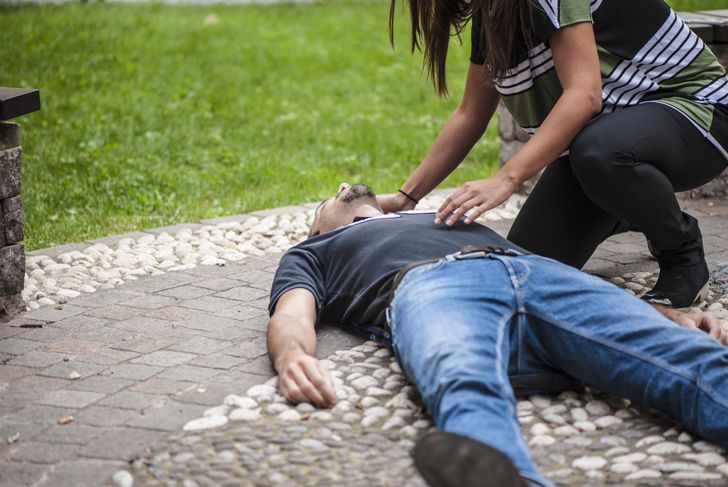Syncope—also called fainting, or passing out—is a sudden loss of consciousness. It can happen due to changes in the nervous system and the circulatory system and is a result of a temporary drop in the amount of blood and oxygen reaching the brain.How do you know if your fainting spell was a sign of a more significant health concern? These ten signs can help you figure it out.
Fainting during or after heart palpitations
Heart palpitations feel like extra strong heartbeats or a fluttering in your chest. Rapid heart beat can cause your blood pressure to drop, which may lead to fainting. You may also experience heart palpitations if your blood sugar is too low, which can be dangerous. This is more common among people with diabetes who take medicine to increase hormone levels in the body.
- Heart palpitations followed by fainting may be a sign of:
- Low Blood Sugar
- High Blood Pressure
- Cardiovascular disease
- Dehydration
- Heat Exhaustion
- Panic or Anxiety Disorder
Fainting if you are underweight
When a person is underweight, there is a good chance that they lack the proper nutrients to sustain their body’s many systems and activities. Certain medical conditions may prevent a person from gaining weight properly, or a person may suffer from an eating disorder such as anorexia nervosa. Nutrient deficiency is a serious medical concern. It can cause many symptoms because many systems in the body are compromised. Deficiencies in iron, folate, and vitamin B12 can cause dizziness, nausea, and fainting. If you are underweight and experiencing fainting spells, talk to your doctor about nutritional supplements.
Fainting with shortness of breath
Shortness of breath or difficulty breathing is considered a medical emergency. It is a symptom of quite a few serious health conditions which require immediate medical attention. One such medical condition is a pulmonary embolism—when there is a blood clot in the lung. The most common symptom of this condition is shortness of breath, which can often lead to fainting. Other symptoms of pulmonary embolism include clammy skin, chest pain, lightheadedness, rapid heartbeat, and spitting up blood.
- Shortness of breath and fainting may also be an indication of these conditions:
- Allergic reaction
- Low blood pressure
- Sudden blood loss
- Airway obstruction
- Heart failure
- Lung disease
Fainting after taking medication
If you have a sudden reaction to taking medication, you may have a drug allergy. This means that your immune system mistakes the drug for a foreign invader, so it attacks, causing a release of histamine. This can cause irregular heartbeat, trouble breathing, swelling, and fainting. These symptoms point to an anaphylactic reaction— a medical emergency which can be fatal if not treated right away.
Fainting during pregnancy
During this fragile time, you want to protect yourself and your baby with the best possible care. Don’t ignore signs of complication during pregnancy. If you feel faint or lightheaded, or you experienced a fainting spell, contact your OB/GYN immediately. Lie down at the first sign of dizziness or lightheadedness, and drink plenty of water. Ask for someone to wait with you or drive you to your healthcare provider or the hospital. You will probably go through a series of blood, urine, and ultrasound tests, and you may be given intravenous rehydration. During pregnancy, you’re always better safe than sorry.
Fainting with fever
Fever is when the body temperature is higher than normal—which is 98.6 F or 37 C. It is a sign that the body is fighting off an infection. A person can develop a fever with all sorts of different diseases or infections, and sometimes it can be managed with over-the-counter (OTC) medications like Advil (ibuprofen) or Tylenol (acetaminophen). When a person faints, however, it is time to visit a doctor. Fainting with a high fever may indicate a potentially life-threatening infection, so take steps to get proper care.
Fainting with an unusual skin rash, blemish, or bump
Unusual marks on the skin that are accompanied by other symptoms including lightheadedness, dizziness, and fainting may be the sign of a viral, bacterial or fungal infection of the skin, or infection which causes skin reactions. Lyme disease, which is transferred through tick bites, may first present as a “bulls-eye” rash. This symptom may be followed by fever, chills, sore throat, muscle aches, headaches, and fainting. If you develop a fever and experience fainting spells with a skin rash, seek immediate medical attention.
Fainting with confusion or disorientation
Confusion and disorientation are signs that the brain is being affected in some way. The symptoms can be caused by lack of oxygen supply to the brain, inflammation in the brain, by a head injury, or by overexposure to toxins. Carbon monoxide poisoning is especially dangerous because it is colorless and odorless. A person with carbon monoxide poisoning may first be confused, disoriented and lightheaded. The person may then feel nauseated and vomit—and they may faint. Carbon monoxide poisoning can result in death. Burning compounds release carbon monoxide, so it is present in cigarette smoke, boat engines, kerosene space heaters, gas water heaters, charcoal grills, and smoke from burning wood. Every home should have a carbon monoxide detector to prevent carbon monoxide poisoning.
Fainting after a head injury
A concussion is a type of traumatic brain injury (TBI) that sometimes results in loss of consciousness, but not always. It can happen during a sports game (high school football accounts for 47% of all reported sports concussions in youths), from a motor vehicle accident, from a fight, a playground injury, or a bike accident—or any other event which causes shaking, banging, or jolting of the head. Concussions can be dangerous, and more than one serious concussion can result in permanent brain damage. It is important to visit a doctor if you experienced a head injury which you think may be a concussion.
Fainting without a trigger
Shock, fear, embarrassment, panic, and extreme heat are all common reasons a person may faint. If loss of consciousness is very sudden or “out of the blue,” you should visit your healthcare provider for testing. Fainting without a known trigger may indicate an underlying condition like nutrient deficiency, cardiovascular disease, lung disease, infection, low blood sugar, high blood pressure and others. When in doubt, always consult with your doctor to make sure you are doing all that you can to stay healthy and strong.

 Home
Home Health
Health Diet & Nutrition
Diet & Nutrition Living Well
Living Well More
More




















